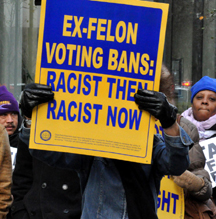Nevada Governor Steve Sisolak recently signed legislation that automatically expands voting rights to people on probation and parole re-enfranchising some 77,000 Nevadans.
In May, Governor Colorado governor Jared Polis signed a measure expanding voting rights to individuals on parole. The bill also requires the Department of Corrections to notify people on parole of their voting rights and how to register to vote and obtain voter information materials. The measure is expected to increase the total number individuals eligible to register to vote by approximately 10,000 per year.
In Washington, D.C., At-large Councilmember Robert White, introduced bills to allow voters to cast ballots by mail and permitting incarcerated felons to vote—a right currently offered only by Maine and Vermont. The full council has already expressed support for the bills.
However, in Florida, Governor Ron Desantis signed a controversial measure, SB 7066, requiring people with felony convictions to pay all court-ordered restitution, fines and fees before they are allowed to vote. This was after 64 percent of Florida voters, passed Amendment 4 to restore voting rights for people convicted of felonies as long as they have completed their sentences, though it excludes people convicted of murder or felony sex offenses.
Voting Expanded in Nevada and Ohio, Road Blocked in Florida

In response, the National ACLU, ACLU of Florida, NAACP Legal Defense and Educational Fund, and the Brennan Center for Justice filed a lawsuit against the state, claiming SB 7066 is an unconstitutional poll tax that undermines the intent of Florida voters when they overwhelmingly passed Amendment 4.
In Florida, as in most other states, a disproportionate share of those arrested and incarcerated are minorities, particularly African Americans. In 2016, more than 418,000 Black people, or 17.9 percent of potential Black voters in Florida couldn’t vote due to their past felony convictions. Approximately 1.5 million people are currently barred from voting in the state because of a past felony conviction — a disproportionate of them Black or Brown.
In Florida, as in most other states, a disproportionate share of those arrested and incarcerated are minorities, particularly African Americans. In 2016, more than 418,000 Black people, or 17.9 percent of potential Black voters in Florida couldn’t vote due to their past felony convictions. Approximately 1.5 million people are currently barred from voting in the state because of a past felony conviction — a disproportionate of them Black or Brown.
Advertisers | Contact Us | Events | Links | Media Kit | Our Company | Payments Pier
Press Room | Print Cover Stories Archives | Electronic Issues and Talk Radio Archives | Writer's Guidelines






